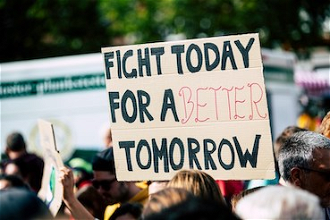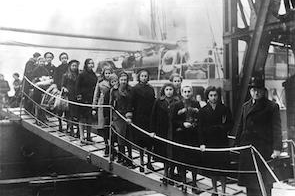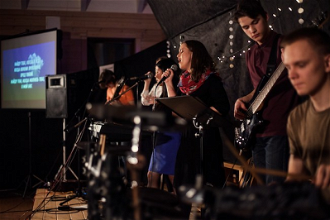Rowan Williams and St Benedict: What kind of society do we want to live in?

Professor Ian Linden
Vacuous worn-out words and phrases are a telling feature of our contemporary political pathology. The saddest, often poured like ketchup on shallow relationships, is 'community'. Saddest because community is a deep human need. Humiliation, alienation and lack of belonging are poorly disguised behind frequent use of 'community'. A true understanding of community, and therefore how to nurture it, is essential for a healthy political culture.
Today, almost any grouping of people with a single common characteristic is at risk of being called a community: the scientific community, the BAME community, the community of plastic bag manufacturers, the help save the hedgehog community (I must declare an interest here), the European Economic Community (before it became a somewhat disunited Union).
Any group can become a victim of stereotyping. It is a short step to treating their common character trait as inherent or to make sweeping negative generalizations about a particular group; this is what is generally meant by racism.
Even if we resign ourselves to the portmanteau nature of that word 'community' we encounter a second problem: group identities obscure the many individual differences found amongst members of a group. I remember a Muslim friend whispering to me during an interfaith discussion: "I wish sometimes I could just be me and not always the Muslim woman". I imagine a Catholic bishop might secretly feel the same. And if we view cultural difference in a pluralist society only in monochrome rather than in its technicolour reality, community relations will remain stuck in a black and white picture of exclusion/inclusion and integration/separation.
But perhaps we make things worse by asking the wrong questions. People talking about community, however vaguely, are usually referring to a good thing, something desirable. But we are aware of exceptions. Not all communities are a good thing and we know they can be oppressive, coercively enclosed, violent places. So why not, as the stereotyped Irishman is credited with saying, start from somewhere else? Ask instead what kind of behaviour, which virtues are required to create good community, the sort of community we want to create when we emerge from Covid and its restrictions.
What constitutes and creates good community? Working together for the common good is one key. Sociability flows most easily from hands to heart to head. Schools and universities require much professional expertise and organisation for the flow to be in the opposite direction: head to heart to hands. To be recognised and acknowledged, above all to contribute and to be needed, are fundamental human needs that, when realised, build community.
The loss of community felt by being made unemployed is so intense euphemisms are used. People are 'let go'. 'Made redundant' too accurately describes the painful reality. The devaluation of low paid labour is deeply divisive. As the American political philosopher, Michael Sandel says there is a deep problem when the idea of the common good we carry in our heads, and how to achieve it, is defined by market mechanisms. No wonder that societies and nations rooted in individualism and consumerism, its citizens striving for self-sufficiency and self-mastery, find the creation of a common life so difficult.
Another key to community is historical humility, shared memory and the disposition to learn from the past. Is there anything we might learn from past conscious efforts to create community? Rowan Williams in his recently published The Way of St. Benedict, about the founder of western monasticism, looks as far back as the sixth century for guidance. It's a short book with long sentences; in a chapter on 'Benedict and the Future of Europe' he asks. "In the half-secularized, morally confused and culturally diverse continent we now inhabit, does the Holy Rule still provide a beacon for common life?" And then the former Archbishop of Canterbury argues cogently that it does have something to say to us. A not so surprising conclusion for viewers of 'The Monastery', the memorable 2005 TV reality series which followed a group of people - several without any religious convictions - spending time with the monks of Worth Abbey.
Benedict's Rule, aimed at building and sustaining community, picks out honesty, accountability, transparency, the peaceful resolution of inevitable conflicts, and stability as the necessary virtues and features of monastic life and the characteristics of a good Abbot. Lord Williams argues for their contemporary salience as political virtues for governance. For instance honesty "is not simply the matter of being transparent about your expenses (although that helps). It has something to do with whether or not society expects in its political class a degree of self-criticism and self-questioning". He also underlines the responsibility of civil society. "An honest society ought to be able to guarantee the possibility for those in public life to acknowledge fallibility or uncertainty", he writes. And in political leadership Rowan Williams seeks 'stable and nurturing habits' omitting - with Christian charity - to add how alien these political virtues seem to the present Prime Minister and his Cabinet.
Remarkably St Benedict's guidelines do still speak to our contemporary condition. "Good governance and government", Rowan Williams writes "is always about engagement with the other, a developing relation that is neither static confrontation nor competition, but an interaction producing some sort of common language and vision that could not have been defined in advance of the encounter." Where are dialogue and constructive interaction to be found?" The grim reality is that our political culture seems the antithesis of what Benedict proposes for sustaining a harmonious, stable community.
The Way of St Benedict was published last year. It performs an important task by invigorating and making meaningful the worn-out but essential word 'community'. And as our intellectual horizons disappear in a haze of slogans, deceit and half-truths, perhaps we can learn from the sixth century how to restore them.
Professor Ian Linden is Visiting Professor at St Mary's University, Strawberry Hill, London. A past director of the Catholic Institute for International Relations, he was awarded a CMG for his work for human rights in 2000. He has also been an adviser on Europe and Justice and Peace issues to the Department of International Affairs of the Catholic Bishops Conference of England and Wales. Ian chairs a new charity for After-school schooling in Beirut for Syrian refugees and Lebanese kids in danger of dropping out partnering with CARITAS Lebanon and work on board of Las Casas Institute in Oxford with Richard Finn OP. His latest book was Global Catholicism published by Hurst in 2009.
See his website here: www.ianlinden.com





















